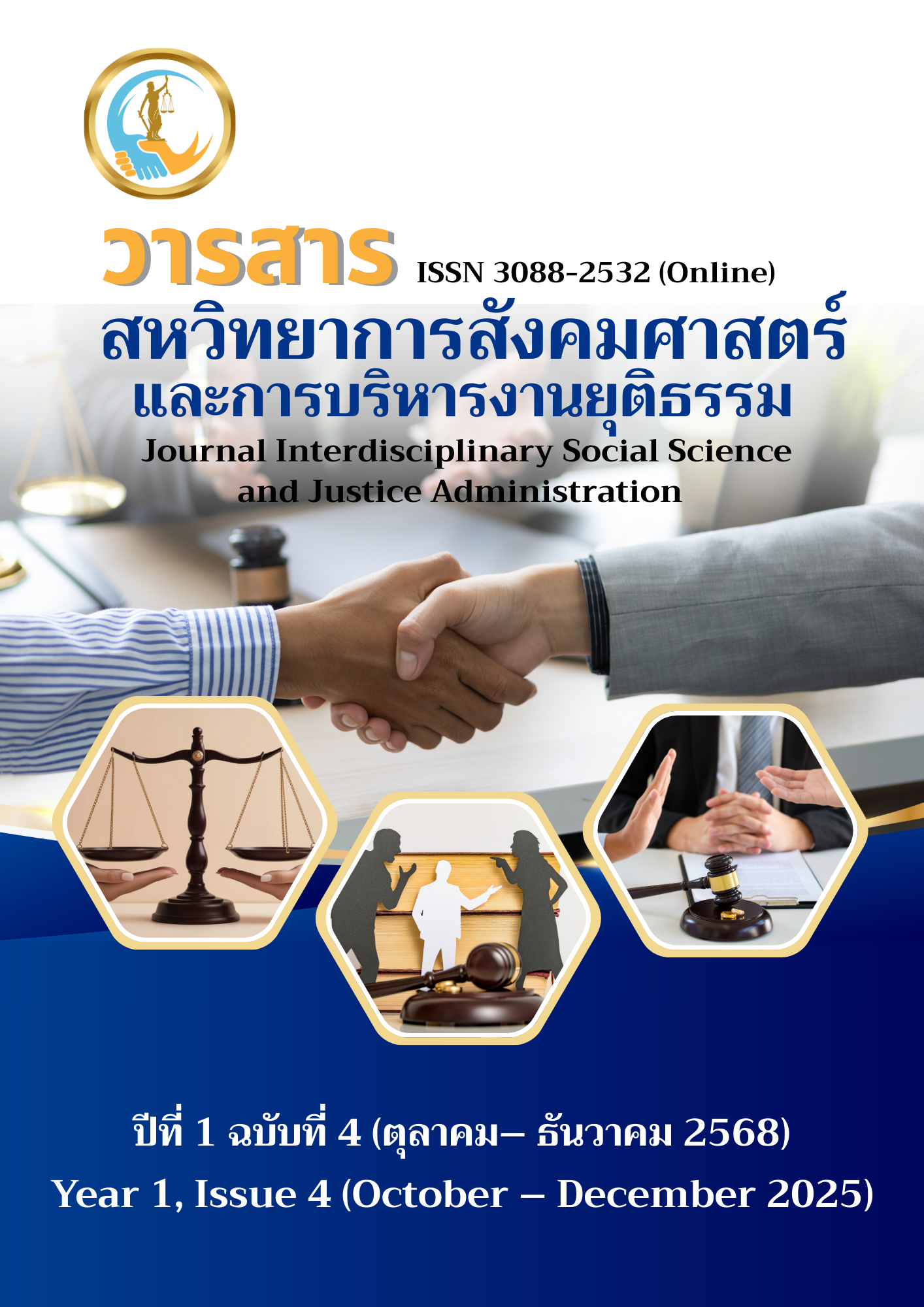
วารสารสหวิทยาการสังคมศาสตร์และการบริหารงานยุติธรรม
ISSN 3088-2532 (Online)
วารสารสหวิทยาการสังคมศาสตร์และการบริหารงานยุติธรรม เป็นวารสารที่มุ่งส่งเสริมการเผยแพร่ผลงานวิจัยและบทความวิชาการที่มีคุณภาพในสาขาวิชาสังคมศาสตร์และการบริหารงานยุติธรรม มีเป้าหมายในการเป็นแหล่งข้อมูลเชิงวิชาการที่ครอบคลุมและเป็นประโยชน์สำหรับนักวิจัย นักการศึกษา และผู้ปฏิบัติงานในวงการที่เกี่ยวข้องกับสังคมศาสตร์และการบริหารงานยุติธรรม โดยมีวัตถุประสงค์ (Aims) และขอบเขต (Scope) ดังนี้
วัตถุประสงค์ (Aims)
- เพื่อเผยแพร่บทความวิจัยและบทความวิชาการที่เกี่ยวข้องกับสังคมศาสตร์ กฎหมายและกระบวนการยุติธรรม
- เพื่อเป็นเวทีวิชาการสำหรับนักวิชาการ นักวิจัย และผู้ปฏิบัติงานในด้านต่าง ๆ ที่เกี่ยวข้อง
- เพื่อสนับสนุนการพัฒนาความรู้ใหม่ในมิติทางสังคมศาสตร์และกระบวนการยุติธรรม
- เพื่อกระตุ้นการแลกเปลี่ยนความคิดเห็นและความร่วมมือทางวิชาการระหว่างบุคคลและองค์กรที่เกี่ยวข้อง
ขอบเขต (Scope)
- การวิจัยในสาขาสังคมศาสตร์ เช่น สังคมวิทยา มานุษยวิทยา เศรษฐศาสตร์ จิตวิทยาสังคม รัฐศาสตร์และรัฐประศาสนศาสตร์
- การศึกษาในด้านกฎหมายและการบริหารงานยุติธรรม อาทิ กฎหมาย กระบวนการยุติธรรม อาชญาวิทยา การบังคับใช้กฎหมาย
- ประเด็นที่เกี่ยวข้องกับนโยบายสาธารณะและผลกระทบทางสังคมจากการดำเนินงานด้านยุติธรรม
- การศึกษาเชิงเปรียบเทียบในระดับชาติและนานาชาติเกี่ยวกับระบบยุติธรรมและบริบททางสังคม
ประเภทบทความที่รับ (Types of Articles)
- บทความวิจัย (Research Articles)
- บทความวิชาการ (Academic Articles)
- บทความปริทัศน์ (Review Articles)
- บทความเชิงนโยบาย (Policy Articles)
- บทความวิจารณ์หนังสือ (Book Reviews)
- กรณีศึกษา (Case Studies)
กำหนดการออกเผยแพร่ (Publication Frequency)
มีกำหนดการตีพิมพ์และเผยแพร่ปีละ 4 ฉบับ โดยแต่ละฉบับประกอบด้วยบทความจำนวน 8 บทความ รวมทั้งสิ้น 32 บทความต่อปี โดยมีรายละเอียดกำหนดการ ดังนี้
- ฉบับที่ 1: มกราคม - มีนาคม
- ฉบับที่ 2: เมษายน - มิถุนายน
- ฉบับที่ 3: กรกฎาคม - กันยายน
- ฉบับที่ 4: ตุลาคม - ธันวาคม
ค่าธรรมเนียมการเสนอบทความเพื่อตีพิมพ์
ไม่มีการเรียกเก็บค่าธรรมเนียมในการเสนอบทความเพื่อตีพิมพ์หรือค่าตีพิมพ์เผยแพร่บทความในวารสาร ทั้งนี้เพื่อสนับสนุนการเผยแพร่ผลงานวิชาการและการวิจัยให้กว้างขวาง และเพื่อส่งเสริมโอกาสทางวิชาการแก่ผู้เขียนทุกกลุ่ม โดยไม่มีข้อจำกัดด้านค่าใช้จ่าย ผู้เขียนสามารถส่งบทความได้โดยไม่มีค่าใช้จ่าย ตั้งแต่กระบวนการพิจารณาจนถึงการตีพิมพ์ในวารสาร
วารสารสหวิทยาการสังคมศาสตร์และการบริหารงานยุติธรรม ใช้กระบวนการตรวจสอบความถูกต้องทางวิชาการ (Peer Review) อย่างเข้มงวดก่อนการตีพิมพ์เผยแพร่ โดยมีรายละเอียดดังนี้
- ใช้รูปแบบ Double-Blind Review ซึ่งผู้ทรงคุณวุฒิและผู้แต่งบทความจะไม่ทราบชื่อกันและกัน เพื่อให้การประเมินเป็นกลาง ปราศจากอคติ และเน้นความถูกต้องเชิงวิชาการ
- บทความทุกเรื่องจะถูกตรวจสอบโดย ผู้ทรงคุณวุฒิภายนอก ที่มีความเชี่ยวชาญในสาขาที่เกี่ยวข้องจากหลากหลายสถาบัน
- จำนวนผู้ทรงคุณวุฒิที่ทำการประเมินบทความ คือ 3 คน
ฉบับปัจจุบัน
ปีที่ 1 ฉบับที่ 4 (2025): ตุลาคม-ธันวาคม 2568
วารสารสหวิทยาการสังคมศาสตร์และการบริหารงานยุติธรรม
ISSN 3088-2532 (Online)
วารสารสหวิทยาการสังคมศาสตร์และการบริหารงานยุติธรรม เป็นวารสารที่มุ่งส่งเสริมการเผยแพร่ผลงานวิจัยและบทความวิชาการที่มีคุณภาพในสาขาวิชาสังคมศาสตร์และการบริหารงานยุติธรรม มีเป้าหมายในการเป็นแหล่งข้อมูลเชิงวิชาการที่ครอบคลุมและเป็นประโยชน์สำหรับนักวิจัย นักการศึกษา และผู้ปฏิบัติงานในวงการที่เกี่ยวข้องกับสังคมศาสตร์และการบริหารงานยุติธรรม
เผยแพร่แล้ว: 2025-12-31
บทบรรณาธิการ
บทความวิจัย
บทความวิชาการ
บทความวิจารณ์หนังสือ



